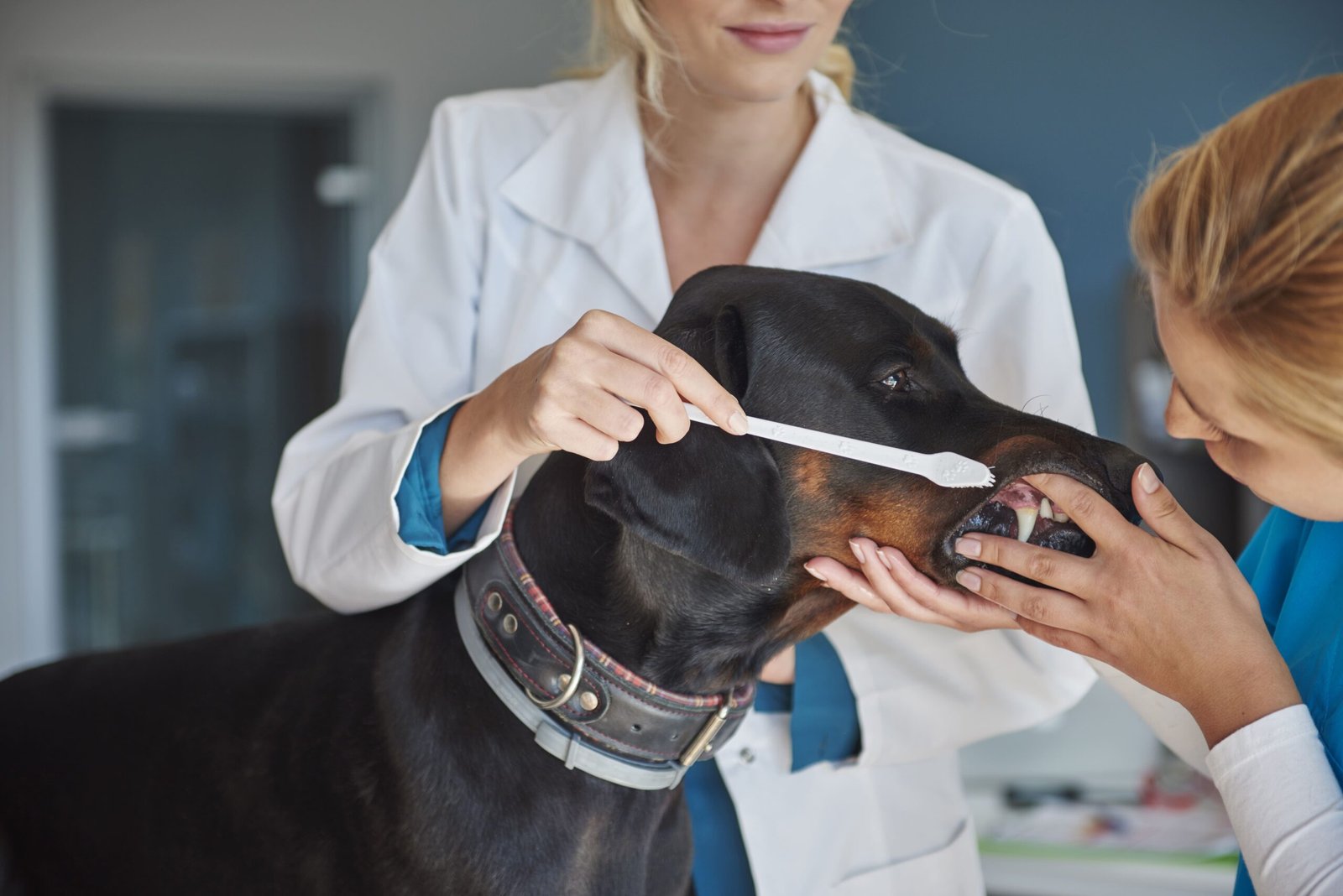
Maintaining your pet’s dental health is crucial for their overall well-being. Poor oral hygiene can lead to various health complications, including heart, liver, and kidney diseases. Oral hygiene for pets is essential because it directly affects their general health, comfort, and longevity. This article explores common dental issues in pets, their symptoms, and how to prevent them through consistent care and preventive measures.
Understanding Common Dental Issues in Pets:
Pet dental diseases encompass a range of oral health problems that can significantly impact a pet’s overall health if left untreated. Poor oral hygiene contributes to severe health issues affecting the heart, kidneys, and liver.
The most common dental issue in pets is periodontal disease, which affects the tissues surrounding the teeth. It begins with plaque buildup that hardens into tartar, leading to gum inflammation (gingivitis). If left untreated, it progresses to periodontitis, which can cause tooth loss and systemic infections.
Other common dental issues include:
- Tooth Resorption: More common in cats, involving the gradual destruction of a tooth’s structure, often resulting in painful lesions and tooth loss.
- Gingivitis: Inflammation of the gums caused by plaque accumulation. It is reversible with proper care but can progress to periodontal disease if ignored.
- Dental Abscesses: Pockets of pus caused by bacterial infections, often resulting from untreated dental issues like fractured teeth.
- Broken or Fractured Teeth: Can occur when pets chew on hard objects or experience trauma, leading to pain, infection, or exposed tooth pulp.
- Malocclusion (Misaligned Teeth): When teeth do not align properly, causing difficulty in chewing and potential oral injuries. It can be hereditary or caused by retained baby teeth.
- Plaque and Tartar Buildup: Plaque is a soft film of bacteria that can harden into tartar if not removed. This buildup contributes to gum disease and tooth loss.
- Bad Breath (Halitosis): Persistent bad breath often indicates underlying dental issues like infections or gum disease.
- Stomatitis: A painful inflammation of the mouth’s soft tissues, particularly common in cats. It may be linked to immune system reactions.
- Oral Tumors: Benign or malignant growths in the mouth that can interfere with eating and cause other health issues.
Symptoms of Dental Issues in Pets:
- Bad breath
- Difficulty eating or chewing
- Red, swollen, or bleeding gums
- Tooth discoloration
- Loose or missing teeth
- Excessive drooling
- Reluctance to eat hard food
Dental plaque and tartar buildup are major contributors to these issues. Regular cleaning and monitoring can help identify and address problems early.
Preventative Care for Pet Dental Health:
Preventative care is the key to maintaining your pet’s oral health and preventing serious conditions from developing.
Importance of Regular Dental Cleaning for Pets:
- Regular dental cleaning helps remove plaque and tartar before they cause severe problems.
- Professional cleanings by a veterinarian are necessary to thoroughly clean under the gum line and other hard-to-reach areas.
Tips for Preventing Dental Issues in Pets at Home:
- Brush your pet’s teeth daily or at least several times a week using pet-safe toothpaste and a soft-bristled toothbrush.
- Provide dental chews and toys designed to reduce plaque buildup.
- Use water additives approved for dental health maintenance.
- Maintain a balanced diet to support overall oral health.
Importance of Regular Veterinary Dental Cleaning:
- Professional cleanings are essential for removing stubborn tartar and assessing the overall health of your pet’s mouth.
- Regular check-ups can help detect issues early, ensuring prompt treatment and preventing complications.
Oral health problems in pets can be avoided with consistent care. Prevention is more effective and less costly than treating advanced dental diseases.
Signs of Dental Problems in Pets:
Recognizing signs of dental problems early can prevent more severe oral health issues from developing. Pets often hide their pain, so observing their eating habits and physical signs is crucial.
Visual Indicators of Dental Problems:
- Red, swollen, or bleeding gums
- Persistent bad breath
- Tooth discoloration
- Difficulty chewing or dropping food from the mouth
- Loose or missing teeth
- Pawing at the mouth or face
- Excessive drooling
Early detection allows for effective treatment and management of oral health problems. Regularly inspect your pet’s mouth for unusual signs and consult a veterinarian if needed.
Tips for Maintaining Your Pet’s Oral Health:
Maintaining your pet’s oral health involves a combination of at-home care and professional veterinary attention.
Effective Methods for Pet Dental Care:
- Brushing your pet’s teeth daily using pet-safe toothpaste.
- Offering dental treats and chew toys specifically designed to clean teeth and reduce plaque buildup.
- Using water additives to promote oral hygiene.
- Scheduling regular veterinary dental check-ups and cleanings.
Recommended Products for Dental Cleaning for Pets:
- Pet-specific toothpaste and toothbrushes.
- Dental chews approved by veterinary organizations.
- Dental wipes for pets that are resistant to brushing.
Benefits of Preventative Care for Pet Dental Health:
- Reduces the risk of developing serious dental diseases.
- Improves overall health and comfort for your pet.
- Extends your pet’s life expectancy by preventing complications associated with oral infections.
الخاتمة
Your pet’s dental health is integral to their overall quality of life. By understanding common dental issues and implementing preventive measures, you can ensure your pet remains healthy and free from oral discomfort. Regular veterinary check-ups, a consistent oral hygiene routine, and providing appropriate chew toys are key components in preventing dental diseases in pets.
FAQs:
Q: How often should I brush my pet’s teeth?
A: Ideally, you should brush your pet’s teeth daily. However, brushing several times a week can still be beneficial.
Q: Are dental chews effective in maintaining my pet’s oral health?
A: Yes, dental chews can help reduce plaque and tartar buildup. Look for products approved by veterinary health organizations.
Q: What are signs that my pet may have dental problems?
A: Symptoms include bad breath, difficulty eating, red or swollen gums, tooth discoloration, and loose or missing teeth.
Q: Can I use human toothpaste to brush my pet’s teeth?
A: No, human toothpaste contains ingredients that can be harmful to pets. Use toothpaste specifically formulated for animals.
Learn more about your pet’s health:

